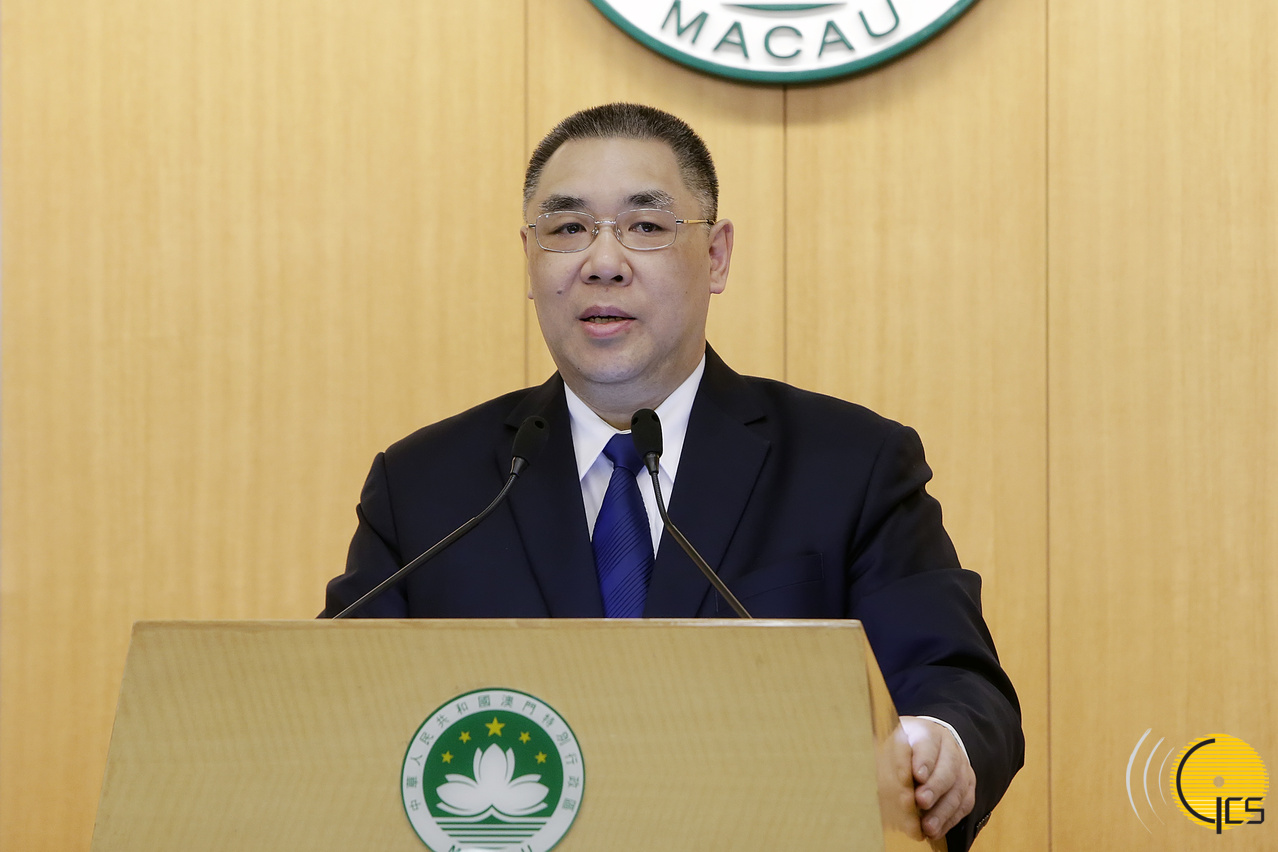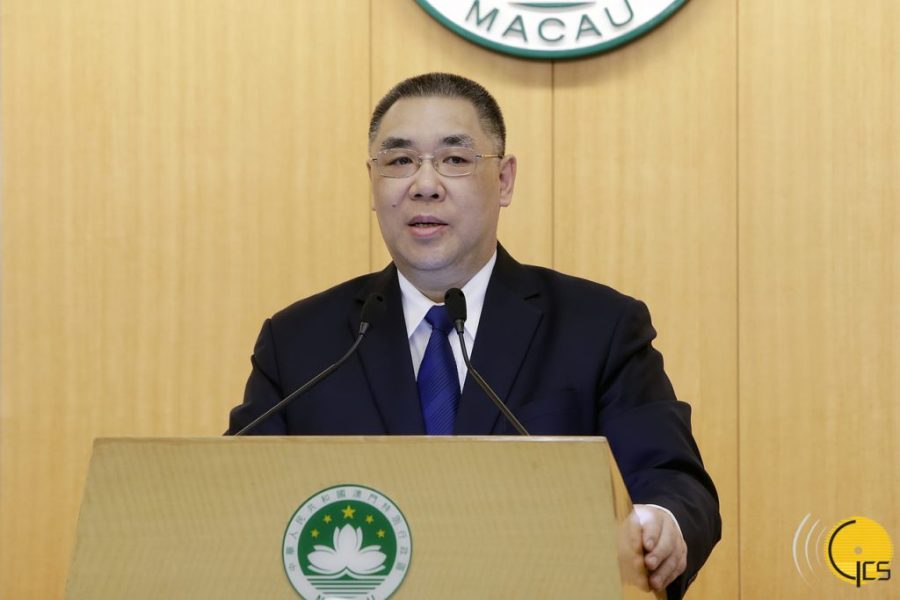Chief Executive Fernando Chui Sai On announced in his 2019 Policy Address on Thursday that his government will spend 18.75 billion patacas on subsidies, an increase of 45 percent from this year’s budget.
Chui also said in his nearly one-hour speech in the legislature’s hemicycle that it was Macau’s duty to protect the nation’s sovereignty, security and development interests, as well as the “grand mission to promote Macau’s lasting stability and prosperity.”
The 61-year-old chief executive delivered the policy address seated next to Legislative Assembly (AL) President Ho Iat Seng who some observers believe might succeed Chui when his second and constitutionally final consecutive five-year term ends in December next year.
The government’s wide range of subsidies covers the elderly, parents, people with disabilities and disadvantaged families, while some of the subsidies benefit all permanent and non-permanent residents.
Residents’ wealth-sharing cash handouts were increased by 11 percent from 9,000 patacas to 10,000 patacas for permanent and from 5,400 patacas to 6,000 patacas for non-residents permits. It was the first increase in the cash handout since 2014.
Senior residents’ pension was raised by 5.2 percent from 3,450 patacas to 3,630 patacas a month. However, the old-age allowance remained unchanged at 9,000 patacas per year.
The government’s birth allowance was increased by 260 patacas to 5,260 patacas. Both parents are entitled to apply at the same time, a government statement on Chui’s policy address pointed out.
Healthcare vouchers, to which only permanent residents are entitled, will remain unchanged at 600 patacas per person for next year.
Tax allowances & incentives
Chui also announced the continuation of a string of tax allowances and incentives, as well as several new ones: enterprises will enjoy a triple reduction in profit for the first 3 million patacas of joint venture research and development (R&D) expenditure, and a double reduction in profit tax for additional expenditure, subject to a ceiling of 15 million patacas; an 8 percent reduction in the property tax rate for leased properties; the personal tax allowance for eligible employees with disabilities will be increased to 198,000 patacas; waivers of profit tax on investment income from local bonds issued by the mainland authorities and state-owned enterprises (SOEs), and exemption from stamp duty for issuing and acquiring the respective bonds; and a profit tax waiver regarding local enterprises’ income received or generated in Portuguese-speaking countries.
Chui also announced a raft of measures on the public housing front, such as the construction of 28,000 flats in four phases in the Zone A land reclamation area near the Hong Kong-Zhuhai-Macau Bridge (HZMB) and 6,500 flats in Avenida Wai Long near the airport.
Land Law study
Chui also said his government would consult members of the public on their views on the Land Law and request the Commission Against Corruption (CCAC) to carry out a study on the highly controversial issue of land concessions annulled by the government because their owners failed to develop the respective plots of land within at least 25 years.
Chui revealed that until September, 75 land concessions were annulled by the government because their owners failed to develop the respective plots within 25 years, as required by the Land Law. Chui said that the 75 plots of land involved a total area of 530,000 square metres.
Some developers have complained that they were unable to develop their land concessions within the 25-year period because of bureaucratic red tape, resulting in calls for a more flexible approach towards the 25-year rule, which would require an amendment to the Land Law, which could be proposed by the government but must be passed by the legislature.
Public security lessons
Chui also said that in order to improve residents’ safety and self-protection, the government would require all schools to run mandatory classes on public security. He also announced plans for the training of community volunteer teams to tackle disasters.
Over 2,000 taxis
Chui also announced plans to nearly double the number of taxis to 2,050, without giving a timeline for reaching the target.
The chief executive also said that the government would intensify its research on the local gaming industry, considering that the city’s three gaming concessions and three sub-concessions will expire in 2020 (SJM and MGM) and 2022 (Wynn, Melco, Galaxy, Sands) respectively. He said the government would consult the public on the matter.
Chui also said the government would promote the construction of budget hotels, “original” theme parks and “integrated” shopping centres.
GBA & BRI participation
Chui pledged Macau’s pro-active participation in the nation’s Greater Bay Area (GBA) project and Belt and Road Initiative (BRI). He also underlined Macau’s solid finances, pointing out that the government’s financial reserves stand at some 554.9 billion patacas, or more than half a trillion patacas.
Chui praised Macau’s residents of Portuguese extraction – customarily known as Macanese – and Portuguese residents for their “important role” in promoting cultural exchanges between China and other countries. He did not mention Macau’s other ethnic groups.
Backup by the motherland
Chui stressed that the better the motherland’s situation is, the better Macau’s situation will be as well, underlining the motherland’s important role as Macau’s “backup”.
He also underlined the fact that next year marks the 70th anniversary of the founding of the People’s Republic of China (PRC) and 20th anniversary of the establishment of the Macau Special Administrative Region (MSAR).
Chui pledged that Macau will proactively contribute to the realisation of the Chinese Dream of National Rejuvenation.
He also said Macau would be an engaged participant in the nation’s New Era.
Press conference
As is customary, the chief executive gave a post-policy address press conference at Government Headquarters.
During the 30-minute press conference, Chui answered 21 questions.
He told the media that there exist different opinions in civil society about the Land Law concerning the maximum allowed development period of 25 years, adding that this was the reason that he decided to request the CCAC to carry out a study on the issue.
Apart from its anti-graft mission, the CCAC also carries out the functions of an ombudsman tasked with tackling administrative illegalities.
Chui insisted, however, that the government does not have any plans to propose Land Law amendments to the legislature.
Chui also said that his government was ready to study the feasibility of setting up a link between Macau and the nation’s high-speed railway network. He also said he expected the Taipa section of the light rail transit (LRT) system to start operating next year.
75 pct
Chui also said he was confident that his government would be able to carry out 75 percent of the objectives defined by the MSAR’s first five-year plan by the end of next year – his last year in office.
Chui also said the government did not intend to present a trade union bill to the legislature.
Several attempts by various initiators to get such a bill through the legislature have failed since Macau’s return to Chinese administration. Macau is the only Chinese jurisdiction that still does not have a trade union law.
Concerning the future of the city’s three gaming concessions and three sub-concessions expiring between 2020 and 2022, Chui pointed out that his term ends on December 19 next year. “I cannot promise things beyond my term,” Chu said, adding, “I can only do, in a responsible way, the preparatory work with my government team during this term.”
Chui also said that so far no-one had presented himself or herself to him as a candidate for Macau’s next chief executive. “I also don’t know who the next chief executive will be…,” Chui said.
The chief executive defended the policy of granting a wide range of public subsidies to various segments of the population, based on Macau’s strong finances, the Basic Law and the government’s determination to share the fruits of the city’s economic success with all residents.






